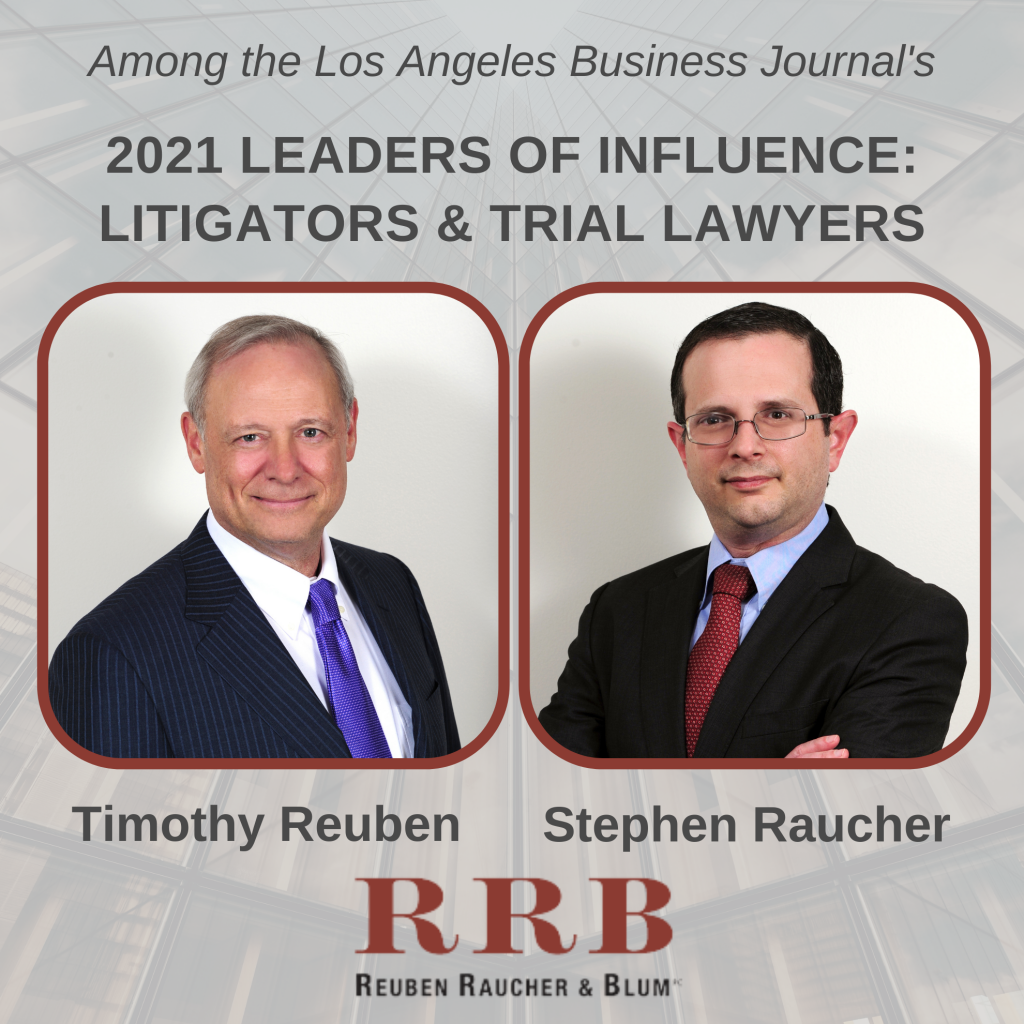The Los Angeles Daily Journal profiles the firm in an article called “The Fixers“.
Blog Archives
Private Judge in Jolie/Pitt Case: No More Flawed Than Usual
Why Won’t The Court Free Britney?
Timothy Reuben and Stephen Raucher Named Top Litigators in Los Angeles
A Plaintiff Cannot be Compelled to Arbitrate the Threshold Question of Employee Status in a PAGA Claim

In Damaris Rosales v. Uber Technologies, Inc. (May 4, 2021) 2021 DJDAR 4243, the Court of Appeal, Second Appellate District, clarified that a plaintiff asserting a claim for civil penalties under the Labor Code Private Attorneys General Act of 2004 (“PAGA”; Lab. Code, § 2698 et seq.) cannot be compelled to arbitrate the threshold question of whether the plaintiff is an employee or an independent contractor for purposes of PAGA.
In Rosales, plaintiff Damaris Rosales (“Plaintiff”) alleged a single cause of action for wage violations under PAGA against defendant Uber Technologies, Inc. (“Uber”). Plaintiff was an Uber driver under a written agreement stating she was an independent contractor and all disputes between Plaintiff and Uber arising out of or related to the agreement, including disputes regarding wage and hour laws, would be resolved by arbitration under the Federal Arbitration Act (“FAA”). Uber brought a motion to compel arbitration, seeking an order compelling Plaintiff to delegate the issue of arbitrability to the arbitrator and to arbitrate the issue of whether Plaintiff was properly classified as an independent contractor under the parties’ arbitration agreement. The trial court denied Uber’s motion to compel arbitration, holding that “no part of the [parties’ arbitration agreement], including the delegation provision, binds the State of California, on whose behalf [plaintiff] brings the PAGA claim.” (Rosales, supra, 2021 DJDAR at p. 4243.)
The Court of Appeal affirmed the trial court’s order denying Uber’s motion to compel arbitration. Citing two recent Court of Appeal cases, the Rosales Court held that a PAGA plaintiff cannot be compelled to arbitrate whether he or she is an “aggrieved employee.” “[T]hreshold issues involving whether a plaintiff is an ‘aggrieved employee’ for purposes of a representative PAGA-only action cannot be split into individual arbitrable and representative nonarbitrable components.” (Provost v. YourMechanic, Inc. (2020) 55 Cal.App.5th 982, 996; see also Contreras v. Superior Court (2021) 61 Cal.App.5th 461, 472-472 [the preliminary question of whether the petitioners were “aggrieved employees” under PAGA “may not be decided in private party arbitration.”].) The Rosales Court also rejected Uber’s argument that, under the FAA, the parties’ agreement to delegate the issue of arbitrability to the arbitrator is enforceable.
It is a well-established rule in California that PAGA claims are not arbitrable because the state will not be a party to an employer and employee’s arbitration agreement. Rosales serves to clarify the broad scope of this rule by holding that a plaintiff cannot be compelled to arbitrate specifically the threshold question of whether the employee is an employee or independent contractor for purposes of PAGA.
Southern California Record’s “City Sued by Slow-Growth Activists Awards Plaintiffs $100K in Attorney Fees” Article
Reuben Raucher & Blum Managing Principal Timothy D. Reuben is quoted in Southern California Record regarding a recent controversial decision by the Santa Monica City Council to award attorney’s fees to a watchdog group suing the City.
Skid Row Ruling Should Be Required Reading
Timothy D. Reuben’s article Skid Row Ruling Should Be Required Reading is published in the Los Angeles Daily Journal on April 27, 2021.
Skid Row Ruling Should Be Required Reading
Court of Appeal Ruling Muddies The Waters On Punitive Damages
Timothy D. Reuben’s article Court of Appeal Ruling Muddies the Waters on Punitive Damages is published in the Los Angeles Daily Journal on March 1, 2021.
Court of Appeal Ruling Muddies The Waters On Punitive Damages
Freedline v. O Organics LLC
445 F.Supp.3d 85 (N.D. Cal. 2020) (dismissal of false advertising claim as to sugar content of kombucha)
Ballot Designations Favor Prosecutors for the Bench
Ballot Designations Favor Prosecutors for the Bench
Timothy D. Reuben’s article Ballot Designations Favor Prosecutors for the Bench is published in the Los Angeles Daily Journal on March 12, 2020.
Courts Shouldn’t Punish Those Who Can’t Afford to Pay Fines
Timothy D. Reuben’s article Courts Shouldn’t Punish Those Who Can’t Afford to Pay Fines is published in the Los Angeles Daily Journal on February 18, 2020.
Courts Shouldn’t Punish Those Who Can’t Afford to Pay Fines
RRB’s Super Lawyers 2020
Reuben Raucher & Blum attorneys Timothy D. Reuben, Stephen L. Raucher, and Stephanie I. Blum are named as Southern California “Super Lawyers” for the 2020 edition of Southern California Super Lawyers magazine.
Job Applicants Cannot Bring Common Law Tort Actions Against Prospective Employers for “Tameny” Discrimination

The Court of Appeal, Third Appellate District, recently clarified that a common law tort action under Tameny for employer conduct in violation of public policy requires an employment relationship. In Williams v. Sacramento River Cats Baseball Club, LLC, 40 Cal. App. 5th 280 (2019), plaintiff Wilfert Williams filed a common law tort action against the Sacramento River Cats Baseball Club (“River Cats”) under Tameny for failing to hire him due to his race. From April 2014 through July 2015, Williams catered meals to the visiting and home team players at Raley field, home of defendant’s minor league baseball team. The visitor clubhouse manager who hired Williams then recommended him to fill the assistant visitor clubhouse manager position. However, Williams, who is black, was never interviewed despite his experience and qualifications. Instead, the River Cats hired an unqualified Caucasian high school student.
Williams sued the River Cats under Tameny for failing to hire him because of his race, arguing that racial discrimination is against public policy. The trial court dismissed Williams’s complaint, noting that California does not recognize a common law cause of action for failure to hire in violation of public policy. Williams appealed.
In 1980, the California Supreme Court held in Tameny v. Atlantic Richfield Co., 27 Cal. 3d 167 (1980), that an employee could bring a tort action against an employer for wrongful discharge against public policy. In Tameny, the plaintiff was fired after he refused to participate in an illegal scheme to fix retail gasoline prices. The Supreme Court found that an employer’s obligation to refrain from discharging an employee who refuses to commit a criminal act does not depend on any express or implied promises set forth in the employment contract, but rather reflects a duty imposed by law on all employers in order to implement the fundamental public policy embodied in the penal statutes. The Court stated, “Where the employer’s motivation for [a] discharge contravenes some substantial public policy principle, then the employer may be held liable to the employee for damages…” Id. at 177.
The California Supreme Court provided guidance in Stevenson v. Superior Court, 16 Cal. 4th 880 (1997), on how to determine whether an employer’s conduct contravened a substantial public policy giving rise to a wrongful termination cause of action under Tameny. A tortious discharge claim requires that the employee be discharged in violation of a policy that is: “(1) delineated in constitutional or statutory provisions; (2) ‘public’ in the sense that it ‘inures to the benefit of the public’ rather than serving merely the interests of the individual; (3) well established at the time of discharge; and (4) substantial and fundamental.” Id. at 889-890. Thereafter, in Miklosy v. Regents of the University of California, 44 Cal. 4th 876, 900 (2008), the California Supreme Court concluded that the Tameny tort requires proof of an employment relationship.
Accordingly, here, because Williams, as a job applicant, was not an employee, River Cats could not be held liable for wrongful discharge against public policy. However, since failing to hire a prospective employee based on race violates public policy and the law, Williams could seek recourse under the Fair Employment and Housing Act, which provides a statutory cause of action for discriminatory refusal to hire. The takeaway here is that job applicants cannot bring Tameny tort actions against prospective employers, and must instead seek recourse for employment hiring discrimination under the Fair Employment and Housing Act.
Court of Appeal Affirms Jury Verdict Because Plaintiffs Presented Prima Facie Case of Whistleblower Retaliation

The Court of Appeal, Second Appellate District, recently issued an opinion illustrating the burden of proof in a whistleblower retaliation case. In Hawkins v. City of L.A., 40 Cal. App. 5th 384 (2019), the court affirmed a jury verdict for plaintiff whistleblowers against the City of Los Angeles, finding that the plaintiffs had presented a prima facie case of retaliation.
Plaintiffs Todd Hawkins and Hyung Kim were part-time administrative hearing examiners for the Department of Transportation under supervisor Walton-Joseph. In June 2011, Walton-Joseph angrily confronted Hawkins about language he used in a decision. Hawkins reported the incident to supervisors, and after another confrontation, filed a complaint with the Equal Employment Opportunity Commission. Hawkins alleged that Walton-Joseph and another supervisor, Kenneth Heinsius, pressured hearing examiners to change their decisions from not liable to liable, violating the Vehicle Code. Over the years, approximately 14 hearing examiners, including Hawkins and Kim, complained to supervisors about being pressured to change decisions. An internal investigation concluded that there was insufficient evidence to support the allegation that hearing examiners were being asked to change decisions.
On October 1, 2013, Heinsius was directed to examine complaints about disruptive conduct of various employees. Heinsius identified Hawkins and Kim. The City fired Hawkins in November of 2013 and Kim in December of 2013. Hawkins and Kim responded by suing the City for whistleblower retaliation, claiming they were fired for whistleblowing on the City’s practice of pressuring hearing examiners to change decisions. The jury found for Hawkins and Kim on those causes of action, and the trial court assessed a penalty against the City under the Private Attorney General Act (PAGA) and awarded plaintiffs attorney’s fees. The City appealed.
Labor Code § 1102.5 prohibits employer retaliation against an employee for disclosing a violation of state or federal statute to a government or law enforcement agency. To establish a violation, a plaintiff must show he engaged in protected activity, his employer subjected him to an adverse employment action, and the existence of a causal link between the two. Hager v. County of Los Angeles, Cal. App. 4th 1538, 1540 (2014). If the defendant provides a legitimate, nonretaliatory explanation for its actions, plaintiff must show the explanation was pretext for retaliation. Morgan v. Regents of University of California, 88 Cal. App. 4th 52, 75 (2000).
The Court of Appeal concluded that Hawkins and Kim were engaged in protected activity by disclosing that they were pressured to change decisions in violation of the Vehicle Code. Disclosing an illegal activity is protected activity under Labor Code § 1102.5. Additionally, the court found that the City subjected Hawkins and Kim to an adverse employment action by firing them. Furthermore, the court found that the closeness in time from the complaints and investigation to the City’s termination of Hawkins and Kim established the necessary causal link. Lastly, the court found that the evidence of Hawkins and Kim being fired only after complaining of illegal practices (and the existence of overwhelming evidence supporting these complaints) supported the jury’s finding that the City’s reasons for termination were pretextual. Hawkins and Kim thus established the three elements of their prima facie case of whistleblower retaliation.
